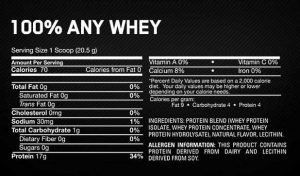 Whether you’re an athlete, bodybuilder, fitness enthusiast, or simply someone looking to get more protein in their diet, you should consider trying whey protein. This supplement is widely regarded as a protein staple because it helps with lean muscle growth, muscle recovery, and overall health and wellness.
Whether you’re an athlete, bodybuilder, fitness enthusiast, or simply someone looking to get more protein in their diet, you should consider trying whey protein. This supplement is widely regarded as a protein staple because it helps with lean muscle growth, muscle recovery, and overall health and wellness.
To understand this protein and how it helps your body and wellbeing, please keep reading this comprehensive guide to learn everything you need to know including the various benefits it offers.
What is Protein?
Protein is a macronutrient, like fat and carbohydrates that is used in every single cell of the body. Hair and nails are mostly made of protein and the body uses it to build and repair tissues. Protein is also used to make hormones, enzymes, and other body chemicals.
Protein is an essential building block of muscles, bones, skin, cartilage, and blood. Unlike fat and carbohydrates, the body does not store protein to maintain an available reservoir, so it can only be obtained from food.
What is Whey Protein?
To understand what whey protein is we must first unpack the meaning of “whey.” Whey is a term that describes milk serum, or the liquid by-product that is created when milk is curdling. In animal milk, whey protein makes up nearly 20% of the protein content while the rest is roughly casein fractions.
In fact, whey proteins actually come in a variety of fractions like globulins, albumins, and more. However, for the purposes of this article, whey protein will simply refer to the whole variety of specific fractions that are found in cow’s milk.
Whey protein is also a complete protein source, which simply means that it provides all 9 essential amino acids, which are, in essence, the complete building blocks of life.
How Whey Protein is Made
Whey protein can be produced from whey through a variety of different membrane filtration methods depending upon the desired protein content. Some filtration methods include microfiltration and ultrafiltration. Once done, the whey protein is spray dried in give it the desired powdered consistency.
Benefits of Whey Protein and Why you Should Add it to your Diet
Protein is one of the key ingredients in muscle growth, development, and wellness. On the smallest scale, proteins are built up of amino acids which are needed for the construction of various bodily systems and tissues as well as other physiological functions. These include neurotransmission, brain metabolism, immune system function and strength, cardiovascular function, and energy production. Due to these dynamic building blocks, proteins then are the important for building and maintaining strong muscles.
There are a number of benefits from consuming whey protein that are all directly linked to the biological roles and properties of essential amino acids. Due to its high amount of L-leucine, whey protein is an important part of muscle protein production and other functions.
The following are some of the whey protein’s main benefits:
- It can provide anti-catabolic properties during extended periods of aerobic activities
- It is quickly and easily absorbed and digested
- It boosts insulin sensitivity which can in turn boost metabolism and result in weight loss
- Improves and enhances the immune system (especially for physically active individuals)
- Helps maintain muscle mass/prevent muscular loss as a result of aging
Whey protein can be found as a powdered supplement but it is also present in some dairy foods. These include:
- Yogurt
- Bread, crackers, cookies (other baked goods that use whey in production)
- Ricotta Cheese
- Cottage Cheese
- Dairy Butters and Creams
- Animal Milk (goat and cow)
 The best way to find out if a certain food naturally contains whey protein is to read the label! If you do not want to purchase powders or other whey protein supplements, you can easily add these foods to your everyday diet. It is important to remember, however, that too much dairy can result in some gastrointestinal problems (bloating, constipation, etc.), so remember to eat these foods in moderation.
The best way to find out if a certain food naturally contains whey protein is to read the label! If you do not want to purchase powders or other whey protein supplements, you can easily add these foods to your everyday diet. It is important to remember, however, that too much dairy can result in some gastrointestinal problems (bloating, constipation, etc.), so remember to eat these foods in moderation.
Last Words
Now that you have a basic understanding of what whey protein is and why it’s good for you, you may be motivated to add it to your diet. In addition to this power-protein, you may want to begin exercising and practicing other methods of self-care that can help bring your body and health into a new realm of well-being. By combining the consumption of whey protein with proper eating habits, regular exercise, and getting enough sleep, you could begin to see the lean, healthy body you’ve always dreamed of forming in no time.

